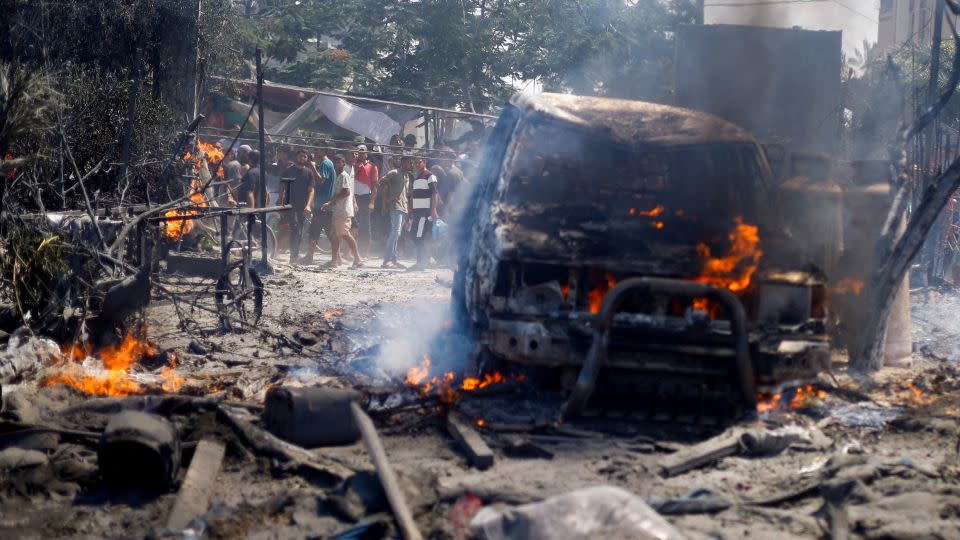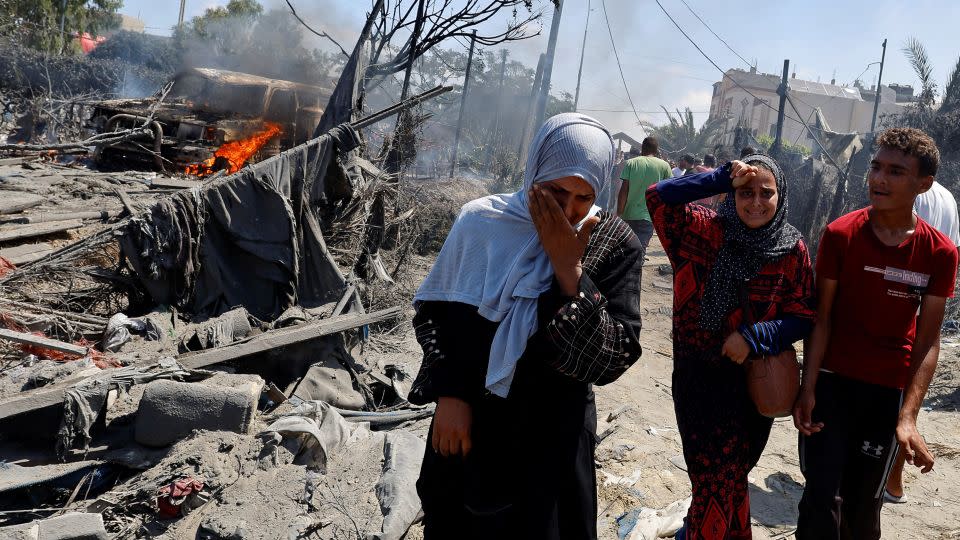At least 90 Palestinians killed in Israeli attack on Hamas military chief

At least 90 Palestinians were reportedly killed in an Israeli attack on a refugee camp in the south of the Gaza Strip. According to Israeli sources, the attack targeted the Hamas military chief, who is considered the mastermind of the October 7 attacks.
Images from Al-Mawasi, designated as a safe zone for Palestinians fleeing fighting elsewhere, show bodies in the streets and destroyed tents.
A senior official at UNRWA, the UN Relief and Works Agency for Palestine Refugees, described Nasser Hospital, which received victims of the attack, as “the most horrific scenes I have seen in my nine months in Gaza.”
“I have seen young children who have had both legs amputated, children who have been paralyzed and unable to receive medical care, and others who have been separated from their parents.”
An Israeli security official told CNN that in addition to the head of the Khan Younis Brigades, Rafe Salama, Mohammed Deif, the leader of the Kassam Brigades, the military wing of Hamas, was also in the sights.
Israeli Prime Minister Benjamin Netanyahu told a news conference in Tel Aviv on Saturday that he was not sure whether Deif and his deputy had been killed, but that he had given the head of Israel’s Shin Bet intelligence agency his approval to carry out the operation after being assured that there were no hostages in the area.
The attack left behind images of devastation. Gaza’s Health Ministry reported at least 90 dead and 300 injured. Half of the dead were women and children, and dozens were injured. CNN has no way of verifying the casualty figures reported by the ministry because it does not distinguish between civilians killed and fighters killed.


The local hospitals in Kuwait and Nasser are struggling to cope with the high number of dead and injured civilians, the ministry said.
“I was sitting in the bathroom, and before I heard the explosions of the attack, the bathroom blew away,” a young boy named Hammoud told a CNN employee on the scene. “Then the whole area filled with smoke, and then the shells started falling.”
Hammoud’s younger brother was killed in the attack, while his sister is currently being treated in hospital for her injuries, his family told CNN.
Another resident, Aida Hamdi, told CNN: “Suddenly we heard rockets hitting. I was baking bread, took my daughter and we ran outside.”
“I threw away all the dough, it was mixed with sand. We heard three impacts, people around me were being tortured, women, men and children.”
Hamas denied Israeli claims that it targeted Deif and Salama and called the killings a “horrific massacre.”
“The occupying power’s claims that it is targeting Palestinian politicians are false, and this is not the first time that the occupying power has claimed that it is targeting Palestinian politicians only to expose its lies later,” it said in a statement.
At least one U.S.-made munition was used in the airstrike. In a video shared on social media, CNN identified the tail fin of a Joint Direct Attack Munition (JDAM), a GPS-guided kit made by Boeing that can be added to so-called “dumb bombs” to guide them to a specific target. Trevor Ball, a former U.S. Army explosive ordnance disposal technician, confirmed the identification of the JDAM tail fin to CNN at the scene.
A similar analysis by CNN found that US-made munitions were used in an attack on a school complex near Khan Younis and in other Israeli attacks on Gaza.
A shadowy figure
Israel’s security and intelligence services had only received information in the last few days about a possible opportunity to attack Hamas’ top military commander. But a clear window of opportunity for the attack on Deif only emerged in the last 24 hours, an Israeli official said.
Israeli Defense Minister Yoav Gallant, Israeli Chief of Staff Lt. Gen. Herzi Halevi and senior Shin Bet officials held several talks overnight to assess the feasibility of an attack before giving the green light, the official said.
A focus of the talks was the evaluation of Israeli intelligence indicating that there were no hostages in the area, the official added, and the impact of such a significant attack on ongoing negotiations on a ceasefire and hostage agreement.
U.S. officials said Israel informed the United States that it had carried out an airstrike on senior Hamas officials on Saturday, but did not give advance warning of the operation.


Little is known about Deif. Believed to have been born in the 1960s, Deif is a bomb maker who was responsible for a wave of suicide bombings in 1996 that killed 65 people in Jerusalem and Tel Aviv, as well as other atrocities designed to derail the peace process.
His full name is Mohammed Diab Ibrahim al-Masri, but he became known as El Deif (the guest) because for decades he slept in a different house every night to avoid being tracked down and killed by Israel.
Deif has been the target of Israeli assassinations before. His wife, seven-month-old son and three-year-old daughter were killed in an Israeli attack in 2014.
In May, the International Criminal Court said it was requesting arrest warrants for Deif and other senior Hamas figures because there were “sufficient grounds” to believe they were responsible for the October 7 attacks that killed around 1,200 Israelis.
The Israeli campaign in the Gaza Strip, aimed at destroying Hamas and freeing the hostages still held there, has since claimed the lives of more than 38,000 people.
Pressure over ceasefire agreement
The attack comes at a sensitive time in negotiations over a possible ceasefire and hostage release. While Deif’s killing would be seen as a major victory for Israel, it could encourage Hamas to harden its position on a three-stage Israeli proposal put forward by US President Joe Biden in late May.
Talks on a ceasefire and the release of the hostages are ongoing. A Hamas political official denied reports on Sunday that Hamas was suspending ceasefire talks because of Saturday’s attack.
Izzat Al-Rishq also described the attack as an “escalation” and claimed that one of the goals of the Israeli government was to “block the path to an agreement that will end the aggression against our people.”
Meanwhile, Netanyahu insisted at his press conference on Saturday that he would not deviate “one millimeter” from the framework set out by Biden. He claimed that Hamas had demanded 29 changes to the proposal, but he had refused to make a single one. “I am not adding or removing any conditions,” he said.
Hamas has not yet commented publicly on Netanyahu’s claims, but a diplomatic source involved in the negotiations said ceasefire talks are planned for next week in Doha, Qatar, despite the attack.
In Israel, protesters and families of hostages took to the streets in several cities on Saturday to demand that the government reach an agreement to release all hostages.
In Jerusalem, crowds outside the Knesset demanded that the government accept the hostage release deal and bring all hostages home immediately. Some protesters also gathered outside Netanyahu’s office.
In Tel Aviv, Andrey Kozlov spoke to the crowd. He was held hostage in Gaza for eight months before the Israeli military freed him in June.
“I want to say that every day in Gaza was hell. Every day felt like it could be my last on earth. Believe me, every day counts, every minute, even every second,” Kozlov said at the hostage square in Tel Aviv.
“I may look OK to you from the outside, but the pain is affecting me more than anyone can see, more than anyone can imagine,” he added.
“I was lucky because I was not held in a tunnel, so I had to endure harsh conditions and mistreatment, but what about the remaining 120 hostages?” Kozlov said.
Kozlov also called on Netanyahu to bring the remaining hostages home, saying: “Please sign a deal!”
The Hostage and Missing Families Forum reminded Netanyahu that there will be “no victory” until all 120 hostages are brought home. “The deal is in the final stages before the signing and return of the hostages; it is time to instruct the negotiating teams to reach agreements and bring everyone home,” it said in a statement.
“We have been waiting for her for 281 days.”
This story has been updated with additional information.
For more CNN news and newsletters, create an account at CNN.com



